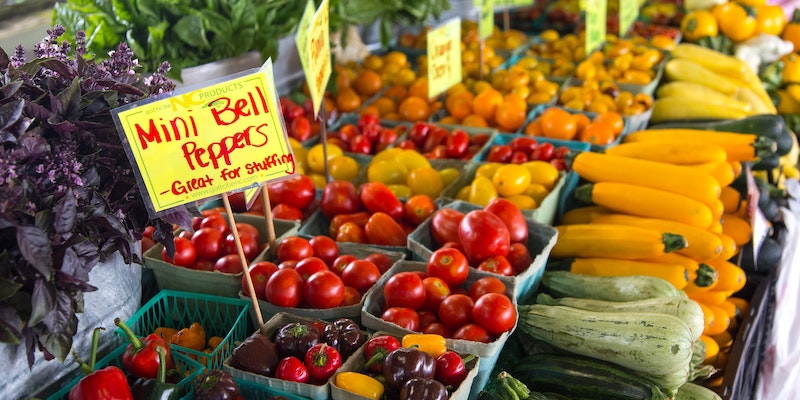Investing in Food Stocks: A Delicious Path to Financial Growth
Oct 16, 2023 By Susan Kelly
Investing in food stocks has always been a popular choice for both seasoned investors and beginners. Food is a universal necessity, and companies in the food industry often demonstrate stability and consistent growth. In this article, we'll explore the world of food stocks, why they can be a smart addition to your investment portfolio, and how to get started.
The Appetizing Appeal of Food Stocks
When you think of investing, tech companies and trendy startups might come to mind. While these sectors offer potential, food stocks provide a sense of comfort and reliability. Here are some compelling reasons to consider adding them to your investment strategy:
Steady Demand
Investing in the food industry offers the advantage of steady demand. Food is a basic necessity, and people will continue to need it regardless of economic ups and downs. This consistent demand can provide stability to your investment portfolio, making food-related stocks a reliable choice for long-term investors.
Resilience During Economic Downturns
Food stocks tend to be resilient during economic downturns. When times get tough, people still need to eat, so they prioritize spending on food. This resilience makes food-related stocks a valuable addition to an investment portfolio, as they can act as a buffer against market volatility, helping to safeguard your investments during uncertain economic times.
Dividend Potential
The dividend potential of food stocks is a significant advantage. Numerous food companies are renowned for their consistent dividend payments. This characteristic can be particularly attractive for income-oriented investors who rely on a steady stream of income from their investments.
Investing in food stocks can provide not only potential capital appreciation but also a reliable income source through dividends, making it an appealing option for a variety of investment strategies.
Diverse Investment Opportunities
The food industry offers diverse investment opportunities, ranging from traditional agriculture to cutting-edge food technology companies. This diversity allows you to tailor your investments to match your risk tolerance and financial objectives.
Whether you prefer the stability of established food giants or the growth potential of innovative startups, there's likely a food-related investment that suits your investment strategy. The food industry's breadth provides investors with the flexibility to create a well-rounded and diversified portfolio.
Key Players in the Food Industry
Before you start investing in food stocks, it's essential to understand the different sectors within the food industry and the key players in each. Here are some of the main sectors and examples of companies in them:

Agriculture
Companies like Archer-Daniels-Midland (ADM) and Bunge Limited (BG) are involved in the production and distribution of agricultural products.
Packaged Food
Household names like Nestlé (NSRGF) and Kraft Heinz (KHC) dominate this sector, offering a wide range of packaged food products.
Restaurant Chains
Companies such as McDonald's (MCD) and Yum! Brands (YUM), which owns KFC and Taco Bell, represents the fast-food sector.
Grocery Stores
Large grocery chains like Walmart (WMT) and Kroger (KR) play a vital role in the food distribution chain.
Food Technology
Innovative companies like Beyond Meat (BYND) and Impossible Foods, though relatively new, have gained significant attention with their plant-based meat products.
How to Start Investing in Food Stocks?
Now that you understand the appeal of food stocks and the sectors within the industry, let's discuss how to get started with your investments:
Step 1: Do Your Research
Before investing in any stock, it's crucial to conduct thorough research. Start by studying the companies you're interested in, their financial health, competitive positioning, and consistent growth prospects. Look for annual reports, earnings releases, and news articles to gather information.
Step 2: Diversify Your Portfolio
Diversification is a key principle of investing. Rather than putting all your money into a single food stock, consider spreading your investments across several companies in different sectors of the food industry. This reduces your risk exposure and can lead to more stable returns.
Step 3: Keep an Eye on Trends
Stay updated on industry trends and consumer preferences. For example, the growing interest in organic and plant-based foods has created investment opportunities in companies that cater to these trends.
Step 4: Consider Dividend Stocks
If you're looking for regular income from your investments, consider dividend-paying food stocks. Companies with a history of consistent dividend payments can provide you with a steady stream of income.
Step 5: Monitor Your Investments
Once you've invested in food stocks, it's essential to monitor your portfolio regularly. Keep an eye on company news, earnings reports, and overall market conditions. Be prepared to adjust your portfolio as needed based on changes in your investment goals and risk tolerance.
Risks Associated with Food Stocks
While food stocks offer several advantages, it's essential to be aware of the potential risks:

Competition
The food industry is highly competitive, and companies need to continuously innovate to stay relevant.
Supply Chain Vulnerabilities
Factors like weather events, disease outbreaks, and supply chain disruptions can impact food production and distribution.
Changing Consumer Preferences
Consumer tastes can change rapidly, affecting the fortunes of food companies. Staying in tune with market trends is crucial.
Regulatory Challenges
Food companies are subject to various regulations and health standards. Changes in regulations can impact operations and profitability.
Wrapping It Up!
Investing in food stocks can be a delicious addition to your investment portfolio. With their stability, resilience, and potential for dividend income, food stocks offer a tasty blend of risk and reward.
However, like any investment, it's essential to do your due diligence, diversify your portfolio, and stay informed about industry trends and potential risks. By following these principles, you can savor the long-term benefits of investing in food stocks while building a more secure financial future. So, are you ready to take a bite out of the food industry and potentially grow your wealth? Best of Luck!

A Guide to the Tax-Filing in 2023: What's My Tax Bracket?
Every taxpayer needs to understand their federal tax bracket, especially in an ever-changing environment like the U.S. Tax Code of 2023. Understanding your tax filing in 2023 is key to avoiding costly mistakes. Learn what your tax bracket is and how to use it best.
Oct 04, 2023 Triston Martin

For Your Off-Road Adventures, Choose the Right Vehicle
Off-highway vehicles (OHVs) include things like ATVs, dirt bikes, side-by-sides, snowmobiles, and 4x4s like jeeps and pickup trucks.
Feb 07, 2024 Susan Kelly

What is a First-Lien HELOC
Consider using a home equity line of credit (HELOC). Find out what a first-lien HELOC is and how it works so you've made an informed decision.
Dec 31, 2023 Susan Kelly

Writing Off Uncollectable Receivables
Writing off uncollectable accounts receivables is a process by which businesses can minimize their losses due to non-payment of debt. It involves making the decision to cease any further collection efforts and classifying the debt as a loss on the company's balance sheet. The process is complex and requires careful consideration of the legal requirements involved
Jan 04, 2024 Susan Kelly

Investing in Food Stocks: A Delicious Path to Financial Growth
Are you hungry for investment opportunities? Explore the world of food stocks to diversify your portfolio.
Oct 16, 2023 Susan Kelly

APY (annual percentage yield) vs. APR (annual percentage rate)
Understand the difference between APY (annual percentage yield) and APR (annual percentage rate) so you can easily compare financial products and make sure you get the best deal for your money.
Feb 05, 2024 Triston Martin